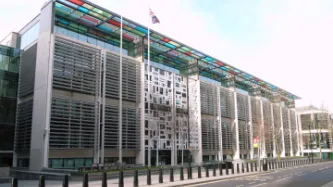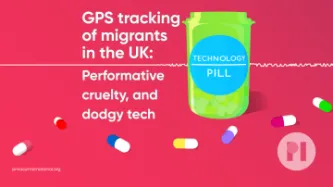Search
Content type: Press release
On 18th August 2025, Privacy International has issued a formal complaint to the UK Information Commissioner (ICO) about the Home Office’s (HO) use of two automated tools in immigration enforcement operations, which PI argues do not adequately comply with the UK General Data Protection Regulation (GDPR) and Data Protection Act 2018 (DPA 2018). The Identify and Prioritise Immigration Cases (IPIC) tool and the Electronic Monitoring Review Tool (EMRT) appear to be used to make life-altering…
Content type: Long Read
On the basis of a year of legal research by PI as well as documents obtained by other civil society organisations, and evidence provided by legal representatives fighting these automated systems on behalf of their clients, on the 18th August 2025, we issued a formal complaint to the UK Information Commissioner (ICO) regarding the UK Home Office’s use of two ‘automated recommendation-making tools’ (ARMTs), the Identify and Prioritise Immigration Cases tool (IPIC) and the Electronic Monitoring…
Content type: News & Analysis
We’ve been asked a lot lately about whether it is safe to travel, particularly to the US. And it’s not surprising why: the US Government is increasing their cruelty at borders.Border management today is fueled by our data, but government officials want more. They want as much data as they can get to catch you out. They’ve reportedly detained or deported people based on their free speech activities, denying entry on tenuous grounds like having the wrong photos on phones (including in in the ‘…
Content type: Video
We explore the legal case, the ways the tag hasn't worked for long periods of time, and a dubious AI the Home Office has been using in decisions as to whether someone remains on a GPS tag.LinksRead more from Katie's law firm, Wilsons Solicitors, about the casePI's Complaint to the ICO (the UK's Data Protection Authority)Read more about relevant cases in which PI has filed witness evidenceThe five companies at the heart of the UK's GPS tagging systemWe tested GPS ankle tags, read how our…
Content type: News & Analysis
Last night, PI, Migrants Organise and Bail For Immigration Detainees joined forces to shine a light on the enduring plight of migrants in the UK who are subject to hardline and dehumanising Home Office policies.
Our joint light projection marked the 10 year anniversary of former Home Secretary Theresa’s May’s infamous 'hostile environment', a policy purposefully cruel that includes indefinite detention of migrants and refugees.
The past decade has also seen the steady creep of data sharing…
Content type: Report
Privacy International’s submissions for the Independent Chief Inspector of Borders and Immigration inspection of the Home Office Satellite Tracking Service Programme
The Home Office have introduced 24/7 electronic monitoring and collection of the location data of migrants via GPS ankle tags. This seismic change cannot be overstated. The use of GPS tags and intention to use location data, kept for six years after the tag is removed, in immigration decision-making goes far beyond the mere…
Content type: Press release
Today, the High Court ruled that the Home Secretary acted unlawfully and breached human rights and data protection laws by operating a secret, blanket policy of seizing, retaining and extracting data from the mobile phones of asylum seekers arriving by small boat.
This claim for judicial review was brought by three asylum seeking claimants: HM represented by Gold Jennings, and KA and MH represented by Deighton Pierce Glynn. The Claimants, like thousands of others arriving by small boat, all…
Content type: News & Analysis
Around the world, we see migration authorities use technology to analyse the devices of asylum seekers. The UK via the Policing Bill includes immigration officers amongst those who can exercise powers to extract information from electronic devices. There are two overarching reasons why this is problematic:
The sole provision in the Policing Bill to extract information rests on voluntary provision and agreement, which fails to account for the power imbalance between individual and state. This…
Content type: News & Analysis
The Aspen Card - the debit payment card given to asylum seekers that PI has previously exposed as a de facto surveillance tool - will be outsourced to a new company. The contract with Sodexo has come to an end and the company Prepaid Financial Services will be taking over.
Our campaign for transparency in relation to the Aspen Card and how it monitors asylum seekers continues. Not only do we demand clarity from the Home Office [read more here], we believe the new provider, Prepaid Financial…
Content type: News & Analysis
Earlier this week, the UK Government announced that no immigration status checks will be carried out for migrants trying to register with their GP and get vaccinated. But temporary offers of safety are not enough to undo the decades of harm caused by policies that have embedded immigration controls into public services.
Years of charging migrants for healthcare and sharing patient data with the Home Office has eroded trust between migrant communities and the NHS. As a result, they might not…
Content type: Examples
Around 8,800 children have been deported from the United States along the Mexican border thanks to a new pandemic-related measure that functionally stripped the rights of those seeking asylum.
Donald Trump’s administration has expelled nearly 160,000 people since the emergency order proclaimed by the CDC took effect in March including roughly 7,600 adults and children who came to the US in families. The emergency order temporarily suspends citizens, regardless of their country of origin, from…
Content type: News & Analysis
In the last few weeks, the UK government has announced various new measures to ensure that crossings across the Channel were “inviable” including by appointing a new role of “clandestine Channel threat commander" and further plans to deploy the navy to stop migrants from crossing to the UK from France across the Channel. Premature plans it seems, as not only would such measures be contrary to the UK’s international obligations to allow individuals to seek asylum in the UK, but also since such…
Content type: Examples
The work and pensions committee has said that the immigration rules that have left 1 million migrant workers in the UK at risk of destitution because they cannot claim universal credit should be suspended. The “no recourse to public funds rule” has left many foreign nationals facing a choice of stay at home in poverty or risking catching or spreading the virus at work. The exclusionary and opaque rules surrounding universal credit left many people, particularly self-employed workers, without…
Content type: Examples
Greece has extended a coronavirus lockdown on its migrant camps for the fifth time. The move has prompted accusations that the government is using the pandemic to limit the migrants' movement.
The Greek Migration Ministry announced on Saturday that the country's migrant camps would remain under lockdown until at least July 19. The restrictions began over 100 days ago, on March 21.
"By a joint decision of the Ministers of Civil Protection, Health and Immigration and Asylum, the measures to…
Content type: Examples
The findings of Freedom from Torture’s report, based on reviews of transcripts of asylum interviews carried out by the Home Office in 2017 or 2018 and a series of focus groups and interviews involving 25 torture survivors who had attended asylum interviews, shows they were often prevented from giving a full account of their experiences or denied the opportunity to explain their evidence.
The report states that some Home Office case workers were found to employ “poor questioning technique” and…
Content type: Examples
Up to 30 charities and organisations have written to home secretary Priti Patel calling for a number of amendments on Tuesday - a year exactly until the scheme ends.
Under current arrangements, EU citizens have been told to apply by June if they wish to continue living and working in Britain.The letter said: “We are concerned that the government has not taken appropriate steps or made the adequate adjustments to the EUSS necessary to protect EU citizens and family members from Covid-19. We…
Content type: Examples
Although the Home Office does not record ethnicity data for detainees, analysis of nationalities of those recently held within the immigration detention estate found that citizens from countries with predominantly black and brown populations are held for substantially longer periods than those from predominantly white countries.
Around a third – approximately a 1,000 – being held in immigration detention centres were freed at the height of the coronavirus pandemic to try and stop the spread of…
Content type: Examples
Immigration rules that have left 1 million migrant workers in the UK at risk of destitution because they cannot claim universal credit should be suspended on public health grounds during the pandemic, a cross-party group of MPs has recommended.
The work and pensions select committee said the no recourse to public funds (NRPF) rule – which hit the headlines recently when Boris Johnson appeared not to be aware of its existence – meant many foreign nationals faced a choice of staying at home in…
Content type: Examples
Excluded groups such as sex workers and asylum seekers are being left behind in the UK’s COVID-19 response as control measures amplify existing health inequalities and put life-saving advice and care further out of reach.
The closure of services and some GP registrations, a lack of access to technology, distrust and fear of authorities, unsuitable or insecure accommodation, and reduced income are among the many challenges facing people in vulnerable circumstances in England.
Doctors of…
Content type: Report
It is common for families with no recourse to public funds who attempt to access support from local authorities to have their social media monitored as part of a 'Child in Need' assessment. This practice appears to be part of a proactive strategy on the part of local authorities to discredit vulnerable families in order to refuse support. In our experience, information on social media accounts is often wildly misinterpreted by local authorities who make serious and unfounded allegations…
Content type: Examples
On March 14 a group of immigrant advocacy groups wrote to the government asking for the Home Office to release all 1,500 to 2,000 detainees in order to protect them from a coronavirus outbreak in the UK's seven removal centres and two short-term holding centres.. On March 21, the Home Office said it had released 300 of the detainees. The charity Detention Action launched a legal action to compel the Home Office to release the most vulnerable detainees and test all detainees. The Home Office…
Content type: Examples
In 2018, repossession services in the US were experiencing a boom in business as the number of Americans failing to keep up with their car payments reached its highest point since 2012. One of these, Ohio-based Relentless Recovery, was increasing its hit rate by equipping its agents' vehicles with cameras to help it build a database of every license plate in the state along with the locations where the vehicles may be easily found. Repo agents collect most of the billions of license plate scans…
Content type: Examples
In February 2019, the UK Home Office told the Independent Chief of Borders and Immigration that it was planning to build a system that could check and confirm an individual's immigration status in real time to outside organisation such as employers, landlords, and health and benefits services. Lawyers and human rights campaigners expressed concerns that the project had received no scrutiny or public discussion, and that the Home Office's record suggested the result would be to unfairly lock…
Content type: Examples
In 2018, the UK Department of Education began collecting data for the schools census, a collection of children's data recorded in the national pupil database and including details such as age, address, and academic achievements. The DfE had collected data on 6 million English children when, in June 2018, opposition led the department to halt the project, which critics said was an attempt to turn schools into internal border checkpoints. In January 2019, however, in an answer to a Parliamentary…
Content type: Examples
The US Department of Homeland Security awarded a $113 million contract to General Dynamics to carry out the Visa Lifecycle Vetting Initiative (VLVI), a renamed version of the Extreme Vetting Initiative and part of a larger effort called the National Vetting Enterprise. In May 2018, public outrage led the DHS to back away from a machine learning system that would monitor immigrants continuously; however, the reason it gave was that the technology to automate vetting did not yet exist. These…
Content type: Examples
In October 2018, the answers to a FOIA request filed by the Project on Government Oversight revealed that in June 2018 Amazon pitched its Rekognition facial recognition system to US Immigration and Customs Enforcement officials as a way to help them target or identify immigrants. Amazon has also marketed Rekognition to police departments, and it is used by officers in Oregon and Florida even though tests have raised questions about its accuracy. Hundreds of Amazon workers protested by writing a…
Content type: Examples
In November 2018, 112 civil liberties, immigrant rights groups, child welfare advocates, and privacy activists wrote a letter to the heads of the US Department of Health and Human Services and the Department of Homeland Security demanding an immediate halt to the HHS Office for Refugee Resettlement's practice of using information given them by detained migrant children to arrest and deport their US-based relatives and other sponsors. The policy began in April 2018, and the result has been that…
Content type: Examples
In November 2018 the UK's Equality and Human Rights Commission warned that asylum seekers have been deterred from seeking medical help in Scotland and Wales since the UK government began forcing the English NHS to charge upfront in 2017 and by fears that medical personnel will comply with Home Office orders to forward their data. The commission, along with health charities and the Labour and LibDem political parties, called for the policy to be suspended. The Home Office policy of moving asylum…
Content type: Examples
The Home Office Christmas 2018 announcement of the post-Brexit registration scheme for EU citizens resident in the UK included the note that the data applicants supplied might be shared with other public and private organisations "in the UK and overseas". Basing the refusal on Section 31 of the Freedom of Information Act, the Home Office refused to answer The3Million's FOI request for the identity of those organisations. A clause in the Data Protection Act 2018 exempts the Home Office from…
Content type: Examples
In October 2018, British home secretary Sajid Javid apologised to more than 400 migrants, who included Gurkha soldiers and Afghans who had worked for the British armed forces, who were forced to provide DNA samples when applying to live and work in the UK. DNA samples are sometimes provided by applicants to prove their relationship to someone already in the UK, but are not supposed to be mandatory. An internal review indicated that more people than the initially estimated 449 had received DNA…











